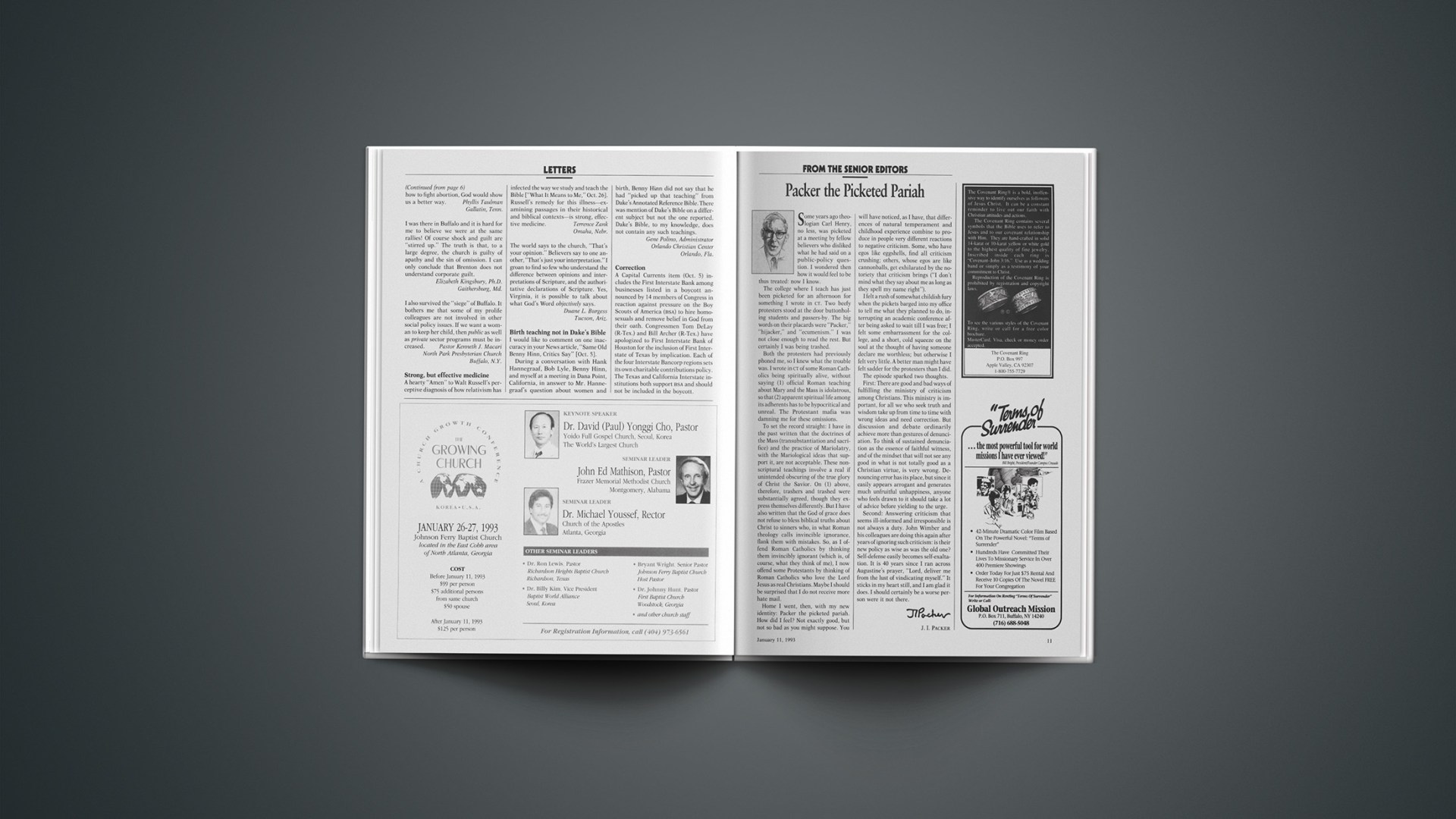Some years ago theologian Carl Henry, no less, was picketed at a meeting by fellow believers who disliked what he had said on a public-policy question. I wondered then how it would feel to be thus treated: now I know.
The college where I teach has just been picketed for an afternoon for something I wrote in CT. Two beefy protesters stood at the door buttonholing students and passers-by. The big words on their placards were “Packer,” “hijacker,” and “ecumenism.” I was not close enough to read the rest. But certainly I was being trashed.
Both the protesters had previously phoned me, so I knew what the trouble was. I wrote in CT of some Roman Catholics being spiritually alive, without saying (1) official Roman teaching about Mary and the Mass is idolatrous, so that (2) apparent spiritual life among its adherents has to be hypocritical and unreal. The Protestant mafia was damning me for these omissions.
To set the record straight: I have in the past written that the doctrines of the Mass (transubstantiation and sacrifice) and the practice of Mariolatry, with the Mariological ideas that support it, are not acceptable. These non-scriptural teachings involve a real if unintended obscuring of the true glory of Christ the Savior. On (1) above, therefore, trashers and trashed were substantially agreed, though they express themselves differently. But I have also written that the God of grace does not refuse to bless biblical truths about Christ to sinners who, in what Roman theology calls invincible ignorance, flank them with mistakes. So, as I offend Roman Catholics by thinking them invincibly ignorant (which is, of course, what they think of me), I now offend some Protestants by thinking of Roman Catholics who love the Lord Jesus as real Christians. Maybe I should be surprised that I do not receive more hate mail.
Home I went, then, with my new identity: Packer the picketed pariah. How did I feel? Not exactly good, but not so bad as you might suppose. You will have noticed, as I have, that differences of natural temperament and childhood experience combine to produce in people very different reactions to negative criticism. Some, who have egos like eggshells, find all criticism crushing; others, whose egos are like cannonballs, get exhilarated by the notoriety that criticism brings (“I don’t mind what they say about me as long as they spell my name right”).
I felt a rush of somewhat childish fury when the pickets barged into my office to tell me what they planned to do, interrupting an academic conference after being asked to wait till I was free; I felt some embarrassment for the college, and a short, cold squeeze on the soul at the thought of having someone declare me worthless; but otherwise I felt very little. A better man might have felt sadder for the protesters than I did.
The episode sparked two thoughts.
First: There are good and bad ways of fulfilling the ministry of criticism among Christians. This ministry is important, for all we who seek truth and wisdom take up from time to time with wrong ideas and need correction. But discussion and debate ordinarily achieve more than gestures of denunciation. To think of sustained denunciation as the essence of faithful witness, and of the mindset that will not see any good in what is not totally good as a Christian virtue, is very wrong. Denouncing error has its place, but since it easily appears arrogant and generates much unfruitful unhappiness, anyone who feels drawn to it should take a lot of advice before yielding to the urge.
Second: Answering criticism that seems ill-informed and irresponsible is not always a duty. John Wimber and his colleagues are doing this again after years of ignoring such criticism: is their new policy as wise as was the old one? Self-defense easily becomes self-exaltation. It is 40 years since I ran across Augustine’s prayer, “Lord, deliver me from the lust of vindicating myself.” It sticks in my heart still, and I am glad it does. I should certainly be a worse person were it not there.










